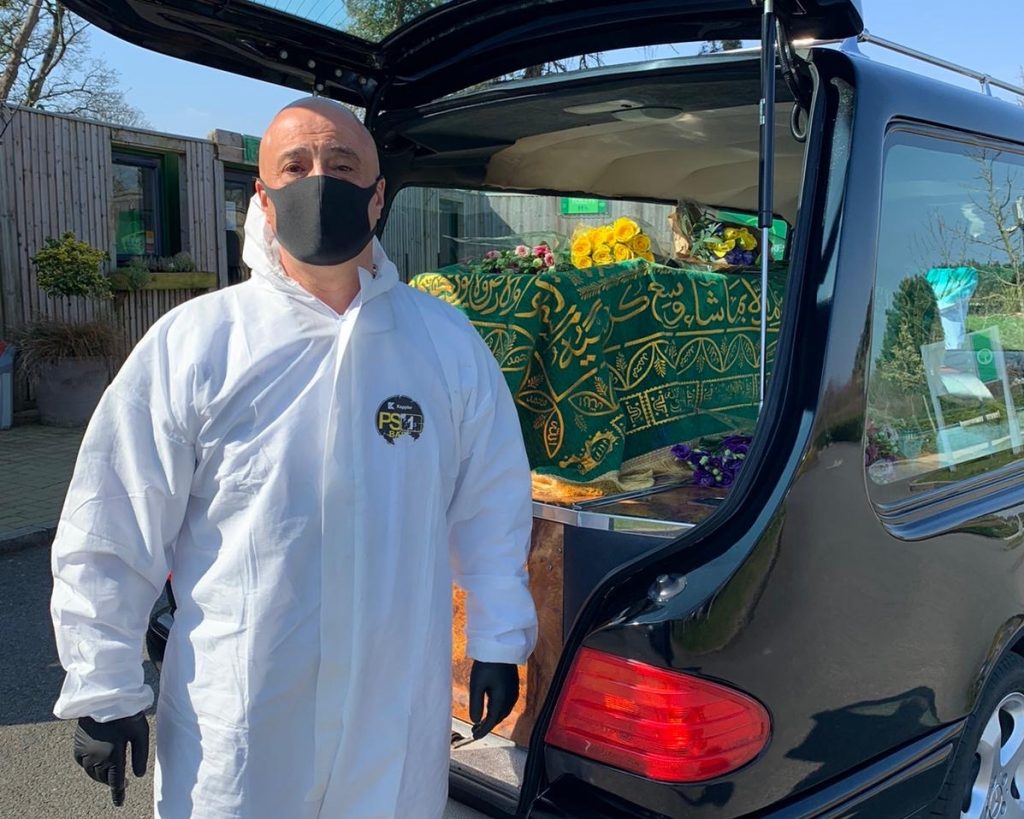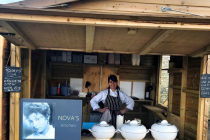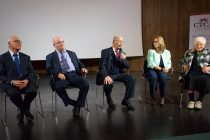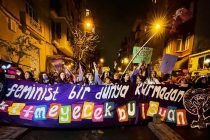From Getty Images to The Times, Hürriyet and LBC, multiple media have covered stories about British Turkish Cypriots in recent weeks.
At the heart of these most of these stories is Shacklewell Lane Mosque (also known as Masjid Ramadan) – a community hub in Dalston, East London, that has come into sharp focus during this coronavirus pandemic.
The BBC London team have visited the mosque on multiple occasions in recent weeks to film members of the British Turkish Cypriot community discuss the impact of the coronavirus on them and their families. Their special news piece was broadcast and published online on Tuesday 27 May.
Under the title Coronavirus: Bodies held in mosque awaiting repatriation, published online in both English and Turkish, the article highlighted the challenges families of 18 deceased Turkish Cypriots face trying to repatriate their loved ones due to the global lockdown.
Penned by BBC News reporter and presenter Tarah Welsh, the article said that, “18 bodies are being kept at the Masjid Ramadan mosque in Hackney”, and continued as follows:
“In normal times, relatives of those who died abroad can contract a funeral director to look after the repatriation of bodies. But due to the pandemic, anyone wanting to transfer a body has to obtain permission from the authorities in northern Cyprus.”
Ms Welsh said the obstacles preventing families returning their loved ones to their native homeland of the Turkish Republic of North Cyprus (TRNC) for burial had left them “devastated”.
The news report included a quote from Oya Tuncalı, the London ambassador for the TRNC, who told the BBC that “approval was granted on 14 May over 11 deaths not thought to have involved coronavirus, for burial in northern Cyprus after 1 June.”
Mrs Tuncalı added that, “Approval is still pending for another seven individuals, all of whom died with Covid-19.”
One of the relatives the BBC interviewed was Ayşen Rezvan, whose brother Mustafa Enver died of Covid-19 in April. Before he passed away, Mr Enver told his sister he wanted to “be sent to Cyprus to be ‘[buried] next to my brother or my father’”.
Ms Rezvan said her elderly mother was desperate for her son’s burial to take place in their village in North Cyprus: “Every time when I talk to her, the first thing she asks me is, ‘where is my son?’” she said.
BBC London clip on Turkish Cypriots & the coronavirus, 27 May 2020
Inci Akin, a relative of Hasan Zort who is also among the 18 dead, told Tarah Welsh that her family in Cyprus had been left “just waiting” by the Turkish Cypriot authorities. Ms Akin said the situation had left her auntie “just devastated.”
Both women featured in the televised 4-minute clip, along with the Erkin Guney, a funeral director and chairman of the trust which administers Masjid Ramadan (also known as Shacklewell Lane Mosque).
Mr Guney, said they had held an “unprecedented” number of funerals in the last six weeks, which had been “traumatic” for the community.
“It’s too personal. It’s close, you know. It doesn’t get any closer when you’re growing up in your community and then you find yourself having to do the last journey for them, understanding the pain the families going through. It’s trauma. It’s trauma on every level.”
The Turkish Cypriot funeral director’s grief was palpable in the BBC London clip and another used on the BBC main evening news as part of a series on the impact of the virus on East London.
In a piece narrated by the BBC 1’s Clive Myrie, Mr Guney is seen standing by shipping containers outside the mosque that have been used as temporary mortuaries during the crisis.
He tells the BBC investigations team: “I’m waiting for it to hit me. I can’t afford to break down,” after a pause, adding, “It’s painful. It’s painful.”
Opening the doors to the temporary mortuary, a visibly distressed Mr Guney explained his emotions: “It’s too personal. It’s close, you know. It doesn’t get any closer when you’re growing up in your community and then you find yourself having to do the last journey for them, understanding the pain the families going through. It’s trauma. It’s trauma on every level.”

Leading Turkish Cypriot cleric (‘hoca’) Husayn Hashim El Bakayi was featured in Getty’s clips of the mosque during its special Kadir Gecesi/Night of Power programme, recorded for broadcast to homes.
He was also filmed by the BBC London team presiding over funeral prayers for the deceased in a private ceremony for family members, who live-streamed the service to those abroad or self-isolating in London.
Husayn Hoca has been at the heart of the Turkish Cypriot community, offering spiritual comfort through his weekly televised mevlit (prayers) for the deceased, which has been broadcast into the homes of thousands of Turkish Cypriots. Talking straight to camera, he articulated the effects of the virus on him and the community, including having to forego cherished rituals for their dead.
Controversially edits were made to the BBC London article after it was first published yesterday. References to the TRNC were replaced with the derogatory term “Turkish-controlled northern Cyprus,”, while Ambassador Mrs Tuncalı was demoted to “the region’s representative.”
The edits have infuriated members of the British Turkish Cypriot community.
Even for a story about the anguish of Turkish Cypriot families unable to repatriate their loved ones it seems that all some people care about is stamping out any mention of North Cyprus – spot the difference: https://t.co/CMFwEJgpF5 pic.twitter.com/PSqitdlrLs
— Eltan Halil (@eltanh) May 27, 2020
Presenting both versions of the article, journalist Eltan Halil tweeted: “Even for a story about the anguish of Turkish Cypriot families unable to repatriate their loved ones it seems that all some people care about is stamping out any mention of North Cyprus – spot the difference”.
Community activist Japha Huse wrote on Twitter, “This is editing out the very nature of the people that you’re writing about. Complete exploitation of people that the @BBC refuse to actually recognise the existence of.
“It’s an extremely offensive change designed to whitewash the reality of Turkish Cypriots in Cyprus. #Shame”.
This is editing out the very nature of the people that you’re writing about. Complete exploitation of people that the @BBC refuse to actually recognise the existence of.
It’s an extremely offensive change designed to whitewash the reality of Turkish Cypriots in Cyprus. #Shame
— Japha (@JaphaOfficial) May 27, 2020
Main photo, top, of UK Turkish Islamic Trust chairman and funeral director Erkin Guney in full PPE, overseeing the London funeral of a Turkish Cypriot Covid-19 victim, March 2020






